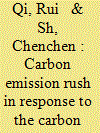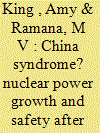|
|
|
Sort Order |
|
|
|
Items / Page
|
|
|
|
|
|
|
| Srl | Item |
| 1 |
ID:
166432


|
|
|
|
|
| Summary/Abstract |
This article examines China's Electric Power Law and the recent policies governing China's electricity sector from the energy-climate-environment dimension. Using the fragmented authoritarianism framework, it captures the legal system that is still rooted in the pre-reform era, and the antinomic policy making that is driven by the policy imperative to accommodate the shifting pattern of energy supply, the growing awareness over climate mitigation and environmental protection. By examining the most recent policy imperatives on regulating new investment and efficiency, and pricing deregulation, this article focuses on changes in the policy arena and their impacts on the regulatory governance of China's electricity sector. Using the methodology of qualitative study, this article critically investigates these policy changes that generate incompatible regulatory concerns. The incompatibility creates competing regulatory concerns over energy-climate-environment in the policy making process, and generates discord between China's central and provincial governments. Dealing with the challenges will depend on developing a legal framework for China's electricity sector. Findings of this article echoes with energy law scholars’ point of view that energy law has a much bigger role to play to balance different or competing policy agendas to deliver better energy policy that delivers the expected outcomes for society.
|
|
|
|
|
|
|
|
|
|
|
|
|
|
|
|
| 2 |
ID:
189976


|
|
|
|
|
| Summary/Abstract |
China has announced ambitious dual-carbon targets to peak carbon emissions by 2030 and achieve carbon neutrality by 2060. However, due to regional differences and lack of accurate emission monitoring data, local governments have been given greater autonomy to achieve these targets. Based on semi-structured interviews and document analysis on emission peak campaigns in inland regions, this article identifies one local game strategy – ‘Dauling Dragon’ (木翼双龙) whereby local governments prioritize high emission projects to be completed by 2030 in order to create a margin for future development, a phenomenon known as ‘carbon rush’ (碳冲锋). The article explores the consequences and antecedents of such a strategy through the lens of environmental authoritarianism. It also makes a theoretical contribution to the conceptualization of the Dauling Dragon strategy, by focusing on its effects on local environmental implementation. Findings from our case study show that China’s climate ambitions, especially its long-term carbon neutrality goal, faces local political obstacles.
|
|
|
|
|
|
|
|
|
|
|
|
|
|
|
|
| 3 |
ID:
142010


|
|
|
|
|
| Summary/Abstract |
Since the Fukushima disaster in Japan, the Chinese government has undertaken a number of measures to improve the safety of its nuclear facilities while simultaneously committing to a rapid expansion of nuclear power capacity. We explore the tension between these twin commitments, examining China's record of implementation of nuclear safety measures since Fukushima. We investigate how nuclear safety interacts with other priorities in shaping decisions about inland nuclear power stations and nuclear reactor design choice. We find that various safety measures have been implemented since 2011, but where their implementation competes with other priorities— such as the economic interests of local governments and nuclear corporations, and central government energy and development targets—safety is not always the primary concern.
|
|
|
|
|
|
|
|
|
|
|
|
|
|
|
|
| 4 |
ID:
112430


|
|
|
| 5 |
ID:
193212


|
|
|
|
|
| Summary/Abstract |
China's economic reform since 1978 has turned a shortage economy into an economy of overcapacity. To curb the capacity surplus, the government put forward a sweeping proposal of “supply-side structural reform,” although without any specifics of implementation. This vagueness has resulted in fragmentation between China's central leadership and local agents. Based on two rail delivery services – China Railway Express Delivery (Zhongtie kuaiyun 中铁快运, CRED) and China–Europe Rail Freight (Zhong–Ou banlie 中欧班列, CERF) – this article argues that fragmentation in authority has allowed and even encouraged local actors to carve profit-making opportunities out of the excess capacities (including idle assets). In so doing, they give substance to what would otherwise be hollow policy rhetoric. Such subnational entrepreneurialism and the resulting tacit dynamics between state and local-level actors add another layer to the fine-grained theorization of fragmented authoritarianism in China: despite fragmentation, China's authoritarian governance endures, but with outcomes now shaped by a cyclical process of decentralization and re-centralization as well as continuous central–local interplay.
|
|
|
|
|
|
|
|
|
|
|
|
|
|
|
|
| 6 |
ID:
171976


|
|
|
|
|
| Summary/Abstract |
There is no question that China is ahead of many developed countries in the digitalization of both its society and surveillance systems. It is also clear that the new technologies made possible by this digitalization — the widespread use of smart ID cards, the Great Firewall, the accumulation of Big Data, the social credit system (SCS) and facial recognition — have enhanced the capacity of the Chinese Communist Party (CCP) to rule China, maintain control over society and stay in power indefinitely. While these are not the only systems in place to manage and control Chinese citizens and this is not their sole purpose, these developments have been rightly seen as part of an ambitious Orwellian project to micromanage and microcontrol every aspect of Chinese society. To better comprehend the significance of this new phenomenon, this paper employs Michel Foucault’s “Panopticon” metaphor, the perfect mean of surveillance and discipline as well as an “apparatus of power.” Yet, these new technologies have their own limits. In real life there is no perfect Panopticon as no society, even the most controlled one, is a sealed prison. Censorship on the Web is erratic and the full implementation of the SCS is likely to be postponed beyond 2020 for both technical and political reasons, as more Chinese citizens have raised concerns about unchecked data collection and privacy breaches. As a result, China is probably heading toward a somewhat fragmented digitalized society and surveillance system that is more repressive in some localities and more flexible in others, as is the case with the Chinese bureaucracy in general.
|
|
|
|
|
|
|
|
|
|
|
|
|
|
|
|
| 7 |
ID:
173792


|
|
|
|
|
| Summary/Abstract |
Graduated control models are often used to explain the variety of government treatment of social organizations in China. These models have been slowly losing their explanatory power in recent years, with advocacy-oriented grass-roots groups participating in the policymaking process. Why are these social groups not regulated in the way the graduated control models predict? Based on an analysis of three recent policy advocacy cases, this article proposes a graduated control 2.0 model to explain the new dynamics in Chinese state–society interactions. The upgraded model argues that the government officials’ behaviour patterns are influenced by numerous factors such as the inherent nature of social groups highlighted by graduated control models, and inter-ministerial competition – the power position of the state sector and its rival sector in the bureaucratic system. Some contingent factors also play a part, such as timing and the NGO’s onstage performance. This research contributes to the ongoing discussion on Chinese state–society relations by developing a theoretical model that highlights both the fragmentation and reactiveness of state control over social groups and further unpacks the ‘monolithic state’ in China studies.
|
|
|
|
|
|
|
|
|
|
|
|
|
|
|
|
|
|
|
|
|